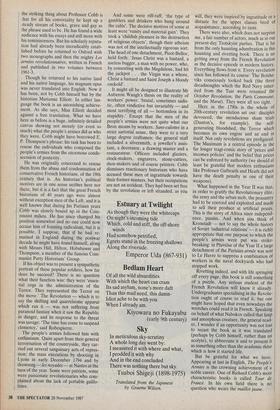The Terror on the move
Geoffrey Wheatcroft
THE PEOPLE'S ARMIES by Richard Cobb translated by Marianne Elliott Yale £30, £9.95 :I accept the Republic.'
But do you accept the Revolution?'
The exchange between two Frenchmen a century ago could sum up 200 years of their country's history. You may accept the end, a bourgeois (or other) republic. Do You accept the means by which it was created? For the question, after all, has its subsidiary: do you accept the Terror? The Great Revolution which began in 1789 reached its apogee over the course of 18 months, from the execution of Louis XVI in January 1793 (following the aboli- tion of the monarchy the previous Septem-
ber) to the coup d'etat of 9 Thermidor: the fall and execution of Robespierre on 27-8 July 1794 and the ensuing reaction. During those months the Revolution was chal- lenged from without and within. The First Coalition was formed and the Republic's armies were defeated; different kinds of anti-revolutionary revolt broke out in the Vendee and Lyons, Bordeaux and Marseil- les.
In Paris the Revolution took its fratricid- al course; Girondins fallen, Marat assassin- ated, Girondins executed in October 1793, then the giddy spring of 1794, the execu- tion in quick order of the Hebertists and the Dantonists, and then Thermidor. Out- side Paris the Revolution defended itself ferociously, by self-proclaimed Terror. Af- ter several attempts to levy a popular army, the first armee revolutionnaire was raised in Paris in September 1793, to be followed by departmental armees. These people's armies were not raised to fight the Austrians or the English but to suppress counter-revolution within France. They were to sustain the Revolution by keeping the peasantry in line and in particular by ensuring the continued supply of grain from the countryside to ravenous Paris, and at the proper price: in May 1793 the Law of the Maximum had decreed prices for corn, to be obeyed on pain of death.
The people's armies of the Year II (which began by the new revolutionary calendar on 22 September 1793) are a great subject. A generation ago they found a great historian in Richard Cobb. His own career has been in its way as curious as those of some of the petits gens of the 1790s to whom he has devoted his life. Born 70 years ago last May and educated as an historian at Oxford, his love affair with France was interrupted by the war. He returned to Paris after the Liberation and his own eagerly awaited demobilisation. There he remained for a full ten years, supporting himself by casual teaching, leading a rackety vie de boheme, but at the same time immersing himself as a private historian — an amateur in both English and French senses. He did not take an academic job until he was nearly 40.
His first lectureship at Aberystwyth (ab- out as inappropriate a place as possible) was followed in rapid succession by jobs at Manchester and Leeds and then, in 1962, by a fellowship at Balliol. In his ten years there he taught several generations of devoted pupils, added to in his subsequent decade in the Chair of Modern History from which he retired three years ago. Married, though very privately so, and with a number of professional friends, but disdaining the administrative chores of university life, he gave the unusual im- pression of preferring the company of undergraduates to that of dons.
Oxford life is full of snares and tares; the striking thing about Professor Cobb is that for all his conviviality he kept up a steady stream of books, grave and gay as the phrase used to be. He has found a wide audience with his essays and still more with his reminiscences. But his scholarly reputa- tion had already been ineradicably estab- lished before he returned to Oxford with two monographs and then the mighty Les armees revolutionnaires, written in French and published in two volumes between 1961-3.
Though he returned to his native land and his native language, his magnum opus was never translated into English. Now it has been, not by Cobb himself but by the historian Marianne Elliott. In either lan- guage the book is an astonishing achieve- tnent. As she says, Miss Elliott decided against a free translation. What we have here as before is a huge, infinitely detailed canvas showing not merely (or even so much) what the people's armies did as who they were. Cobb might have borrowed E. P. Thompson's phrase: his task has been to rescue the individuals who composed the people's armies from the enormous conde- scension of posterity.
He was originally concerned to rescue them from the abuse and condemnation of conservative French historians, of the 19th century that is. An historian's political motives are in one sense neither here nor there, but it is a fact that the great French historians of 40 years ago were almost without exception men of the Left, and it is well known that during his Parisian years Cobb was closely bound up in the Com- munist milieu. He has since changed his position somewhat and no one could now accuse him of foaming radicalism, but it is possible, I suppose, that if he had re- mained in England during the postwar decade he might have found himself, along with Messrs Hill, Hilton, Hobsbawm and Thompson, a member of the famous Com- munist Party Historians' Group.
If his object was to present a sympathetic portrait of these popular soldiers, how far does he succeed? There is no question What their function was: they were `essen- tial cogs in the administration of the Terror. They represented the Terror on the move.' The Revolution — which is to say the shifting and quarrelsome apparat which ran it — was not suffering from paranoid fantasy when it saw the Republic in danger, and its response to the threat was savage: `The time has come to suspend clemency,' said Robespierre.
The people's armies followed him with enthusiasm. Quite apart from their general terrorisation of the countryside, they car- ried out several sanguinary acts of repres- sion: the mass executions by shooting in Lyons in early December 1794 and by drowning — les noyades — at Nantes at the turn of the year. Some were patriots, some were passionate revolutionaries who com- plained about the lack of portable guillo- tines. And some were riff-raff, 'the type of gamblers and drinkers who hung around the cafes'. The decisive motives of some at least were 'vanity and material gain'. They took a 'childish pleasure in the destruction of religious objects', though their atheism was not of the intellectually rigorous sort. The head of one detachment, Picot-Belloc, held forth: 'Jesus Christ was a bastard, a useless bugger, a man with no power, who, by consorting with the Magdalene, had hit the jackpot . . . the Virgin was a whore, Christ a bastard and Saint Joseph a bloody cuckold'.
It might all be designed to illustrate Mr Auberon Waugh's thesis on the reality of workers' power: 'brutal, sometimes sadis- tic, often vindictive but invariably — and most terrifying of all — bottomless in its stupidity.' Except that the men of the people's armies were not quite what our Bron means by workers. Sans-culottes in a strict sartorial sense, they were to a very large degree craftsmen: the general staff included a silversmith, a jeweller's assis- tant, a decorator, a drawing master and a restaurateur. Officers included glaziers, clock-makers, engravers, stone-cutters, shoe-makers and of course printers. Cobb dismisses reactionary historians who have accused these men of ingratitude towards their former masters, but their occupations are not an accident. They had been set free by the revolution or left stranded, as you will, they were inspired by ingratitude or a distaste for the upper classes bred of acquaintance, according to taste.
There were also, which does not surprise me, a fair number of actors, much as in our present-day Trotskyist parties. That is far from the only haunting adumbration in this haunting and rivetting book. There is no getting away from the French Revolution as the decisive episode in modern history. Everything flows from it. Every revolution since has followed its course. The Bolshe- viks consciously looked back (the three dreadnoughts which the Red Navy inher- ited from the Tsar were renamed the October Revolution, the Paris Commune, and the Marat). They were all too right. Here in the 1790s is the whole of 20th-century revolution set out: disciples devoured, the mendacious sham trials (Danton's, for example), the self generating bloodshed, the Terror which becomes its own engine and an end in itself. Not only revolutions are prefigured. The Maximum is a central episode in the far longer tragi-comic story of 'prices and incomes policies' and the belief that prices can be enforced by authority (we should at least be grateful that modern enthusiasts like Professor Galbraith and Heath did not have the death penalty as one of their weapons).
What happened in the Year II was that, in order to gratify the Revolutionary elite, the army and the urban mob, the peasantry had to be coerced and exploited and made to sell their produce at artificial prices. This is the story of Africa since independ- ence, passim. And when you think of Kronstadt — not to say the whole history of Soviet 'industrial relations' — it is richly appropriate that one purpose to which the people's armies were put was strike- breaking: in Pluviose of the Year II a large detachment of the Parisian armee was sent to Le Havre to suppress a combination of workers in the naval dockyards who had stopped work.
Rivetting indeed, and with life springing off every page, this book is still something of a puzzle. Any serious student of the French Revolution will know it already. Undergraduates specialising in the Revolu- tion ought of course to read it, but one might have hoped that even nowadays the wretches could read it in French. Speaking on behalf of what Nabokov called that limp and amorphous creature, the general read- er, I wonder if an opportunity was not lost to recast the book as it was translated (perhaps by Cobb himself, rather than an acolyte), to abbreviate it and to present it as something other than the academic these which is how it started life.
But be grateful for what we have. Appearing at last in English, The People's Armies is the crowning achievement of a noble career. One of Richard Cobb's most characteristic books is called Tour de France. In his own field there is no question who wears the maillot jaune.



































































 Previous page
Previous page